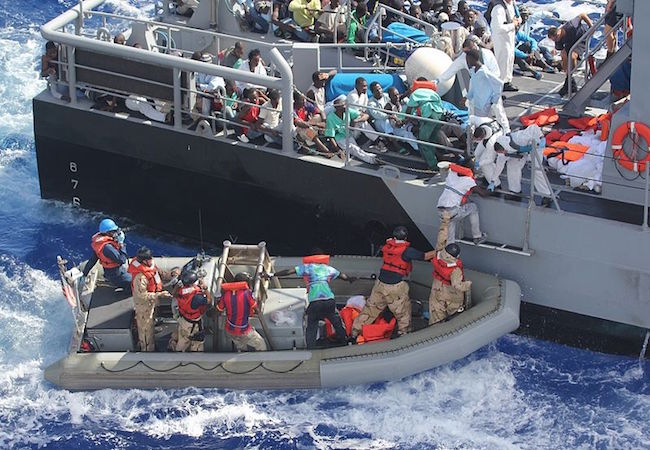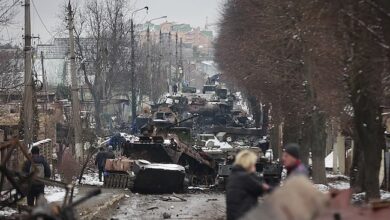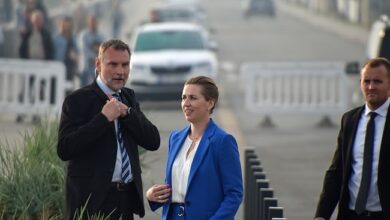Unprecedented 1 million refugees, migrants flee to Europe in 2015, UN says

The number of refugees and migrants fleeing to Europe in 2015 has topped an unprecedented 1 million, and at least 3,600 drowned or went missing trying to make the crossing, the UN said on Tuesday, calling for much more to be done to receive and aid those uprooted by persecution, conflict and poverty.
“Persecution, conflict and poverty have driven a staggering 1 million people to seek safety in Europe in 2015,” Farhan Haq, the deputy UN spokesman, told reporters here, citing estimates by the UN Refugee Agency (UNHCR) and the International Organization for Migration (IOM).
As of Monday, some 972,500 people have crossed the Mediterranean Sea, while more than 34,000 people have crossed from Turkey into Bulgaria and Greece by land, Haq said at a daily news briefing here.
“The number of people displaced by war and conflict is the highest in Western and Central Europe since the Balkan crises of the 1990s,” when several conflicts broke out in the former Yugoslavia, he said.
“One in every two of those crossing the Mediterranean this year — half a million people — were Syrians escaping war,” Haq said. “Afghans accounted for 20 percent and Iraqis for seven percent.”
According to UN refugee agency reports, the Syrian civil war, which has been raging since March 2011, has led to a massive displacement that has also, to a large extent, contributed to the huge influx of refugees in the Middle East and Europe.
UN High Commissioner for Refugees Antonio Guterres said that as anti-foreigner sentiments escalate in some quarters, it is important to recognize the positive contributions that refugees and migrants make to the societies in which they live and also honour core European values: protecting lives, upholding human rights and promoting tolerance and diversity.
More than 800,000 refugees and migrants came via the Aegean Sea from Turkey into Greece, accounting for 80 percent of those arriving irregularly in Europe by sea, while the number of those crossing from North Africa into Italy dropped slightly, from 170,000 in 2014 to around 150,000 in 2015.
Over the year, the number of people crossing the Mediterranean increased steadily from around 5,500 in January to a monthly peak in October of more than 221,000, said the UN agencies.
After an initial chaotic reaction which resulted in tens of thousands of people moving from Greece through the Western Balkans and northwards, and finding themselves blocked at various borders, a more coordinated European response is beginning to take shape.
The UNHCR launched an emergency response to complement European efforts, with more than 600 emergency staff and resources deployed to 20 different locations to provide life-saving aid and protection, advocating for human rights and access to asylum, particularly for refugees with specific needs, such as unaccompanied children and women-headed households.
But much more needs to be done to reinforce required reception capacity at points of entry and allow for the humane and effective accommodation, aid, registration and screening to identify those in need of protection, those to be relocated to other countries within the European Union, and those who do not qualify for refugee protection for whom dignified return mechanisms have to be put in place, according to the UN refugee agency.
At the same time, the UNHCR continues to call for safe, regular ways for refugees to find safety through more resettlement and humanitarian admission programmes, more flexible visa arrangements, more private sponsorship programmes and other possibilities.
In mid-December, the UNHCR brought together governments and civil society to a two-day forum in Geneva to address the root causes of displacement as conflicts in the Middle East and Africa drive unprecedented numbers of people from their homes while floods and droughts wreak havoc with lives and livelihoods in Asia.
“Our world today is at a crossroads,” Guterres said at the opening session of the forum. “From a humanitarian perspective, this juncture is defined by two ‘mega-problems’ in an environment of global insecurity.”
“A seemingly uncontrollable multiplication of violent conflicts in an environment of global insecurity, and the pervasive and growing effects of natural hazards and climate change that are already shaping our present and will shape our future even more,” he said, calling for an approach that looked beyond immediate emergency response to “what got us here in the first place.”
At his year-end press conference on Dec. 16, UN Secretary-General Ban Ki-moon said that the World Humanitarian Summit will be held in May 2016 in Istanbul, Turkey, adding that the upcoming conference will be critical moment to address systemic funding problems, and agree on concrete steps to better prepare for and respond to crises.
“The world must invest more political energy in preventing and ending conflict, and in addressing violations of human rights — our best early warning signs of greater trouble to follow,” Ban said.
Meanwhile, Ban reviewed the situation of “epic flows” of refugees and internally displaced persons (IDPs) in 2015, saying that in the New Year “the world needs to aim for a new global compact on human mobility.”




